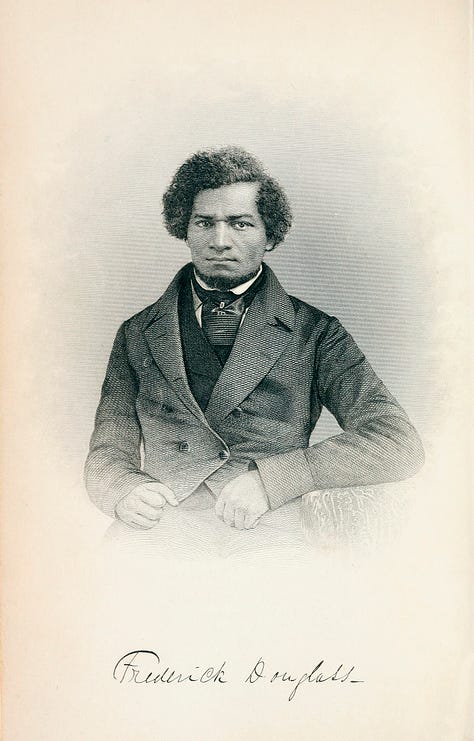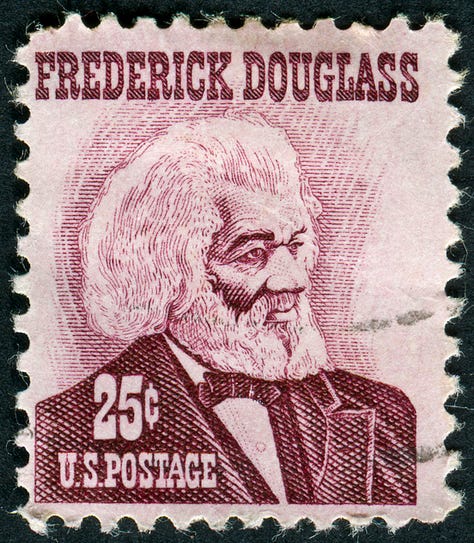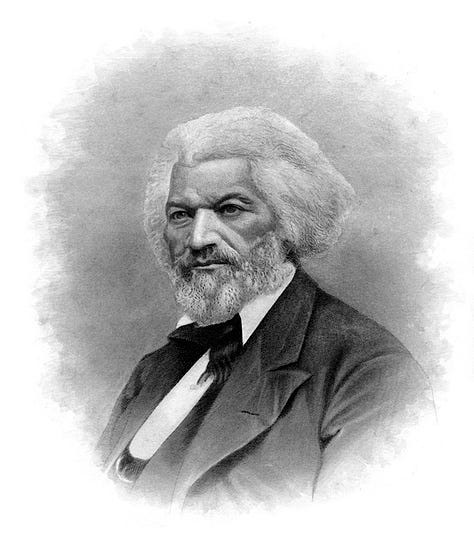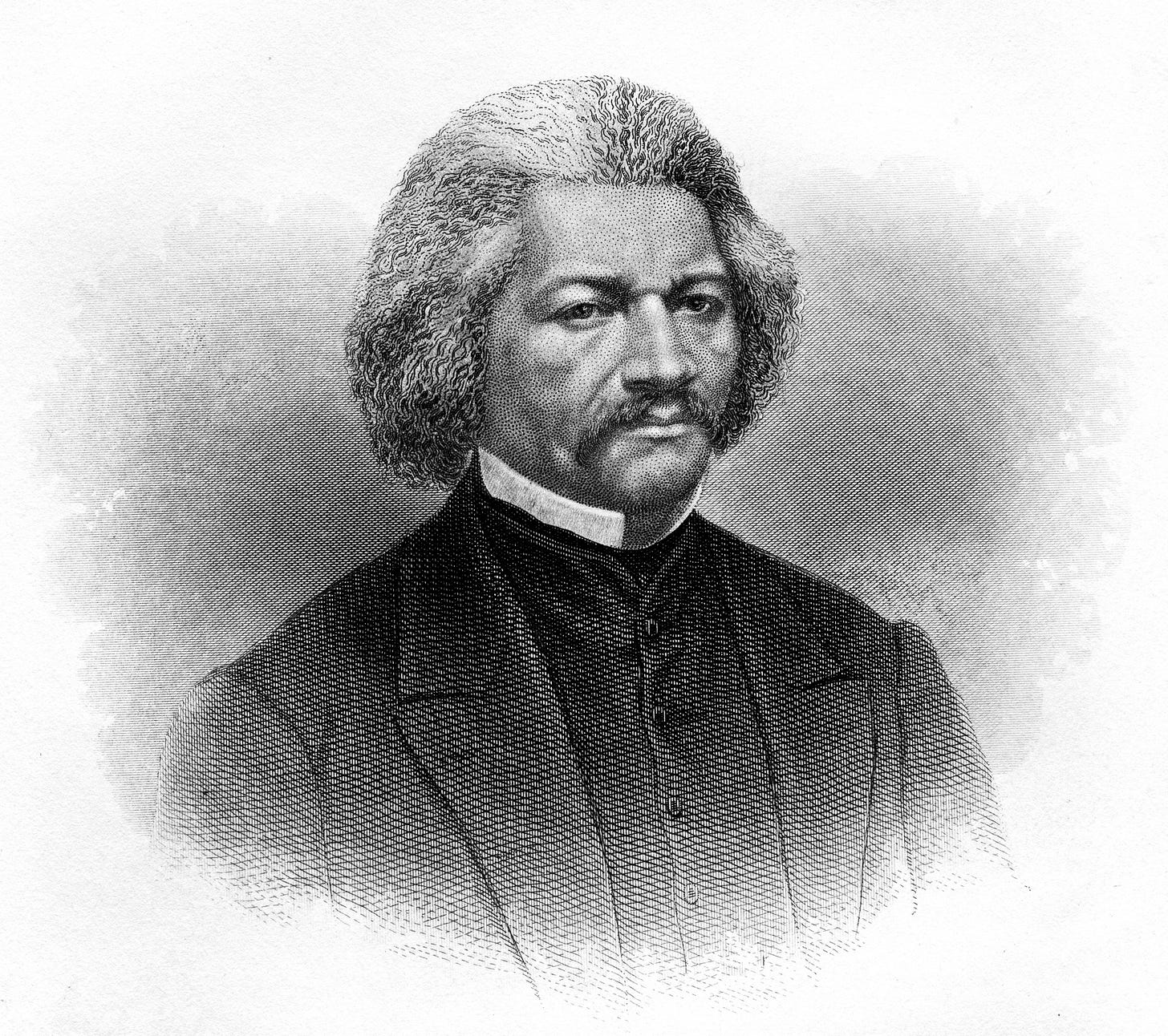America's Original Sin Still Lingers
Remembering Frederick Douglass' powerful words on slavery, race and independence—for this 4th of July and in the wake of the Supreme Court's affirmative action decision
As the 4th of July approaches, I return to the words of the great Frederick Douglass who, as I note below in a post from two years ago, “lived in chains, who was beaten nearly to death and saw his brothers and sisters tortured and kept in bondage” and who emerged from that scarring experience “to speak with such clarity and reason.” While his words never lose their resonance or, sadly, their relevance, they seem particularly important in the wake of the Supreme Court’s 6-3 ruling to end affirmative action in higher education on Thursday.
It’s not just the way this decision will impact the struggle for equal opportunity and diversity, nor how it represents the refusal of the conservative supermajority to recognize the persistent reality of systemic racism. By gutting affirmative action, this Court actively perpetuates centuries of repression by restricting the opportunity of many Americans, undermining the promise of “liberty and justice for all.”
It’s as if the reality of race and racism in America—and the responsibility to address its attending injustices—has reached its expiration date. It’s as if the meaning of the 14th Amendment to provide equal protection under the law no longer holds sway.
“Many universities,” Chief Justice John Roberts wrote in his majority opinion, “have concluded, wrongly, that the touchstone of an individual's identity is not challenges bested, skills built, or lessons learned but the color of their skin. Our constitutional history does not tolerate that choice."
But as Justice Ketanji Brown Jackson’s wrote in the fierce dissent I quoted in Friday’s post, “With let-them-eat-cake obliviousness, today, the majority pulls the ripcord and announces ‘colorblindness for all' by legal fiat. But deeming race irrelevant in law does not make it so in life.”
Note also the dissenting words of Justice Sonya Sotomayor, which address the fallacy of Roberts’ opinion. “Today, this Court stands in the way and rolls back decades of precedent and momentous progress. It holds that race can no longer be used in a limited way in college admissions to achieve such critical benefits,” she wrote. “In so holding, the Court cements a superficial rule of colorblindness as a constitutional principle in an endemically segregated society where race has always mattered and continues to matter.”
Allow me a brief concurring opinion: Race has always mattered in America and continues to matter, whether the majority of the Supreme Court chooses to recognize this or not. The original sin of slavery and its consequences still linger as a poison in our society. It’s why, 171 years after Frederick Douglass spoke to The Rochester Ladies’ Anti-Slavery Society, his searing message about the meaning of the 4th of July for the slave continues to demand our attention.



How can a man who lived in chains, who was beaten nearly to death and saw his brothers and sisters tortured and kept in bondage, emerge to speak with such clarity and reason? How did he maintain his sanity in a world of such irrefutable and overwhelming contradictions and cruelty? Over and over, I’m amazed by the remarkable writing of Frederick Douglass, one of America’s greatest citizens.
One of his most powerful and poignant texts, still deeply relevant today, is his speech from 171 years ago today, July 5, 1852, delivered at the Corinthian Hall in Rochester, New York. "What to the Slave is the Fourth of July?” was delivered at the request of The Rochester Ladies’ Anti-Slavery Society.
This speech included hope: “Notwithstanding the dark picture I have this day presented, of the state of the nation, I do not despair of this country. There are forces in operation which must inevitably work the downfall of slavery.” And there was respect for what Americans had created: He called America’s founding fathers “truly great men”—and he drew “encouragement from ‘the Declaration of Independence,’ the great principles it contains, and the genius of American Institutions….”
But his speech laid out clearly the gulf that existed between him—and, as he put it, his “woe-smitten people”—and white Americans:
“I say it with a sad sense of the disparity between us. I am not included within the pale of glorious anniversary! Your high independence only reveals the immeasurable distance between us. The blessings in which you, this day, rejoice, are not enjoyed in common. The rich inheritance of justice, liberty, prosperity and independence, bequeathed by your fathers, is shared by you, not by me. The sunlight that brought light and healing to you, has brought stripes and death to me. This Fourth July is yours, not mine. You may rejoice, I must mourn.”
What follows are more highlights of this powerful speech, followed by a link to the full text. I hope many of you will take the time to read it. As we have learned in these last years, freedom and democracy have to be fought for, not assumed. And that depends on confronting our challenges—our intolerable disparities—as clearly as we can. Few did it as forcefully as the great Frederick Douglass.
“Fellow-citizens, pardon me, allow me to ask, why am I called upon to speak here to-day? What have I, or those I represent, to do with your national independence? Are the great principles of political freedom and of natural justice, embodied in that Declaration of Independence, extended to us? and am I, therefore, called upon to bring our humble offering to the national altar, and to confess the benefits and express devout gratitude for the blessings resulting from your independence to us?”
“…I say it with a sad sense of the disparity between us. I am not included within the pale of glorious anniversary! Your high independence only reveals the immeasurable distance between us. The blessings in which you, this day, rejoice, are not enjoyed in common. The rich inheritance of justice, liberty, prosperity and independence, bequeathed by your fathers, is shared by you, not by me. The sunlight that brought light and healing to you, has brought stripes and death to me. This Fourth July is yours, not mine. You may rejoice, I must mourn. To drag a man in fetters into the grand illuminated temple of liberty, and call upon him to join you in joyous anthems, were inhuman mockery and sacrilegious irony. Do you mean, citizens, to mock me, by asking me to speak to-day? If so, there is a parallel to your conduct. And let me warn you that it is dangerous to copy the example of a nation whose crimes, towering up to heaven, were thrown down by the breath of the Almighty, burying that nation in irrevocable ruin! I can to-day take up the plaintive lament of a peeled and woe-smitten people!”
“Fellow-citizens, above your national, tumultuous joy, I hear the mournful wail of millions! whose chains, heavy and grievous yesterday, are, to-day, rendered more intolerable by the jubilee shouts that reach them. If I do forget, if I do not faithfully remember those bleeding children of sorrow this day, ‘may my right hand forget her cunning, and may my tongue cleave to the roof of my mouth!’ To forget them, to pass lightly over their wrongs, and to chime in with the popular theme, would be treason most scandalous and shocking, and would make me a reproach before God and the world. My subject, then, fellow-citizens, is American slavery. I shall see this day and its popular characteristics from the slave's point of view.
“Standing there identified with the American bondman, making his wrongs mine, I do not hesitate to declare, with all my soul, that the character and conduct of this nation never looked blacker to me than on this 4th of July! Whether we turn to the declarations of the past, or to the professions of the present, the conduct of the nation seems equally hideous and revolting. America is false to the past, false to the present, and solemnly binds herself to be false to the future. Standing with God and the crushed and bleeding slave on this occasion, I will, in the name of humanity which is outraged, in the name of liberty which is fettered, in the name of the constitution and the Bible which are disregarded and trampled upon, dare to call in question and to denounce, with all the emphasis I can command, everything that serves to perpetuate slavery the great sin and shame of America! ‘I will not equivocate; I will not excuse’; I will use the severest language I can command; and yet not one word shall escape me that any man, whose judgment is not blinded by prejudice, or who is not at heart a slaveholder, shall not confess to be right and just.”
“For the present, it is enough to affirm the equal manhood of the Negro race. Is it not astonishing that, while we are ploughing, planting, and reaping, using all kinds of mechanical tools, erecting houses, constructing bridges, building ships, working in metals of brass, iron, copper, silver and gold; that, while we are reading, writing and ciphering, acting as clerks, merchants and secretaries, having among us lawyers, doctors, ministers, poets, authors, editors, orators and teachers; that, while we are engaged in all manner of enterprises common to other men, digging gold in California, capturing the whale in the Pacific, feeding sheep and cattle on the hill-side, living, moving, acting, thinking, planning, living in families as husbands, wives and children, and, above all,p confessing and worshipping the Christian's God, and looking hopefully for life and immortality beyond the grave, we are called upon to prove that we are men!
These excerpts are from The Life and Writings of Frederick Douglass, Volume II: Pre-Civil War Decade 1850-1860, shared by PBS here. You can also view a moving reading by Douglass’ descendants.
America, America is sustained by paid subscriptions, making it possible to keep nearly all the writing available for everyone. If you’re not already a paid subscriber, I hope you’ll consider becoming one.



You fail to mention that whatever our race or color we all live on native Land. Stolen land. Land drenched in the blood of its first people. The Fourth of July celebrates the so-called liberty of a nation that exists solely because it destroyed the liberty of and killed and impoverished millions of this nation’s native people.
The Supercilious Court has inserted itself into our society/culture more as a legislative branch of government, than as a judicial branch. They want to reconstruct and recontextualize a free and open society into a selective society: Where the many may want entrance, only a few shall be admitted. The Court is not "conservative". It is oppressive.